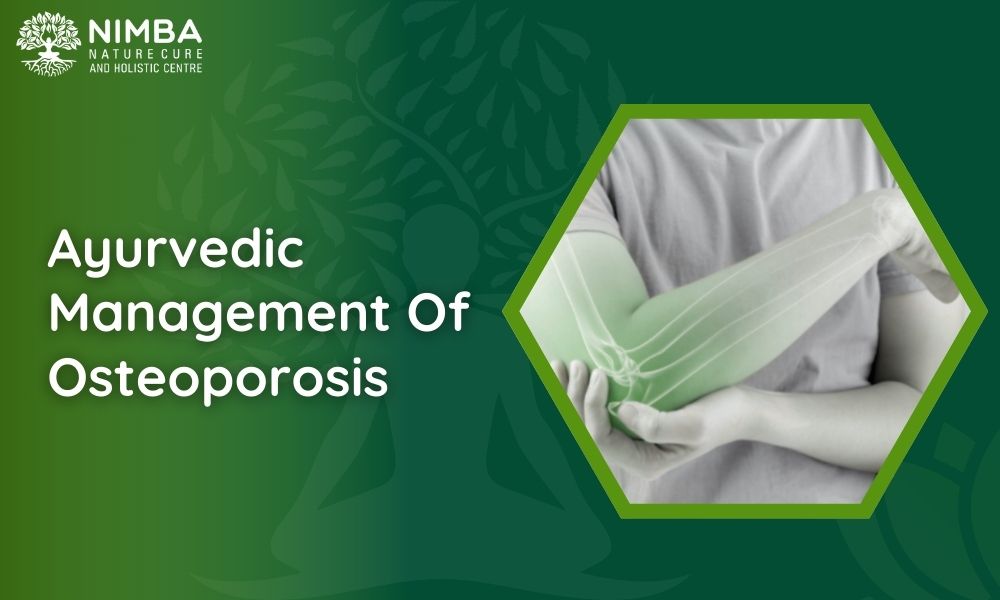Ayurvedic Management Of Osteoporosis
By: Nimba - July 10, 2024
Osteoporosis is a fairly common health ailment which mostly occurs in the elderly population given that it causes the bones to become brittle and prone to breakage. Traditional processes include the use of drugs with possible side effects. However, one of the traditional systems of Indian origin that seems to have methods of handling osteoporosis naturally and holistically is Ayurveda. As we can see, this blog aims at explaining how osteoporosis treatment in Ayurveda plays an important role in the preservation of the denseness of the bones as well as enhances the quality of the lives of sufferers.
Understanding Osteoporosis in Ayurveda
In Ayurveda, osteoporosis is known as Asthi Kshaya which means the loss or deficient quantity of this structure called Asthi i.e bones. This condition is termed as Mamsa Vata’s because this disease is concluded from the disturbance of Vata dosha which naturally leads to the fatty tissue and bone tissue destruction.
Ayurvedic Dietary Recommendations
An appropriate meal plan is recommended in Ayurvedic management of osteoporosis. Here are some dietary guidelines to follow:
- Calcium-Rich Foods: Try to include the products derived from yoghurt such as milk, yoghurt and cheese. Spinach, kale and broccoli, green leafy vegetables contain a lot of calcium.
- Sesame Seeds: Sesame seeds are nutritious and that can be consumed daily as well since they contain calcium. Sesame seed oil can also be used for purposes of cooking food since it is edible oil Thus sesame seed oil can also be used for frying foods to enhance their flavours.
- Nuts and Seeds: Mouth opening foods such as almonds, walnuts, flaxseed has what is known as good bone foods.
- Whole Grains: Consume whole grains that are wheat, barley and brown rice among others.
- Herbs and Spices: Select major spices such as turmeric, ginger, cumin beneficial in improving digestion, absorption, and assimilation of the nutrients.
- Vitamin D: Get enough sun exposure and remain fit to allow your body to have the right calcium absorption vitamin d.
Ayurvedic Lifestyle Practices
- Daily Routine (Dinacharya): People should stick to their normal schedule throughout the day because this assists in regulating the body. Do oil bathing with warm sesame oil (abhyanga), wake from bed early, and do some mild physical activity or yoga.
- Stress Management: Try out yoga and Pranayama where yoga is taught as a way of dealing with stress since it is a disorder which worsens the Vata dosha.
- Sleep: Try to get as much sleep as possible, at least 7- 8 hours every night, because the human body requires it to enrich bone formation process.
Ayurvedic Herbal Remedies
There are a large number of herbs used in Ayurveda for the management of bone health disorders and osteoporosis. Some of the key herbs include:
- Ashwagandha (Withania somnifera): These include; Ashwagandha which is well known for its ability to restore energy and assists in building up strong bones.
- Shatavari (Asparagus racemosus): Fennel is good for bones and is particularly recommended to women in their postmenopausal years.
- Guggulu (Commiphora mukul): Anti-inflammatory in nature, guggulu is useful where the bones are painful and inflamed.
- Amalaki (Emblica officinalis): Packed with Vitamin C, Amalaki aids in relation to the synthesis of collagen which is significant to bone strength.
- Hadjod (Cissus quadrangularis): This herb has been used particularly as a remedy for bone setting and to make the bone stronger.
Ayurvedic Therapies
- Panchakarma: This therapy supports detoxification procedure and thus helps to maintain and restore the doshas in the body. We can include treatments like Basti (Medicated Enema) and Abhyanga (Oil Massage) more in osteoporosis patients.
- Kizhi: In this therapy, warm poultices of specific local herbs are applied on the complaint parts, and this reduces pain and inflammation and enhances the nature of the bones.
- Pizhichil: One of the varieties of therapeutic oil massages is Pizhichil that can benefit in making bones strong and regularising circulation.
Osteoporosis treatment in Ayurveda offers a comprehensive approach to managing and preventing bone loss through natural and holistic means. By incorporating dietary changes, lifestyle modifications, herbal remedies, and therapeutic practices, Ayurveda provides a sustainable way to enhance bone health and overall well-being. If you are considering Ayurvedic treatment for osteoporosis, it is advisable to consult with a qualified Ayurvedic practitioner to develop a personalised treatment plan tailored to your specific needs.
At Nimba Nature Cure, we are dedicated to providing holistic and natural solutions for managing osteoporosis. Our experienced practitioners and state-of-the-art facilities ensure that you receive the best care for your bone health. Embrace the wisdom of Ayurveda and take a step towards a healthier, stronger you.





